.
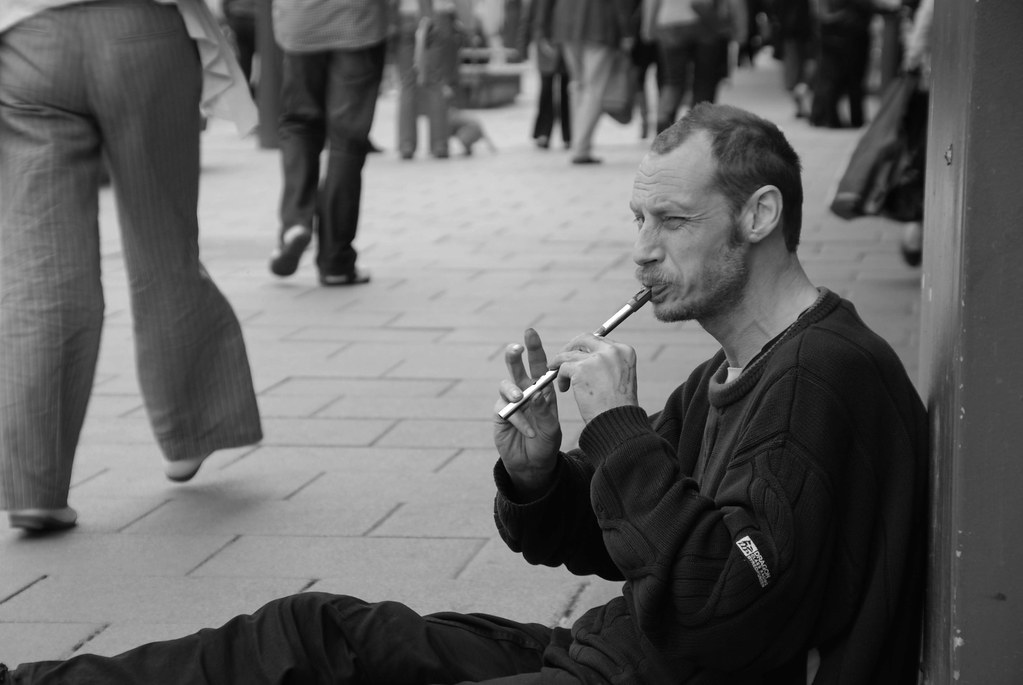
Any spare change pls (street pennywhistle player): photo by Fiona Alton, 14 May 2010 (National Archives UK)
He cut a sappy sucker from the muckle rodden-tree,
He trimmed it, an’ he wet it, an’ he thumped it on his knee;
He never heard the teuchat when the harrow broke her eggs,
He missed the craggit heron nabbin’ puddocks in the seggs,
He forgot to hound the collie at the cattle when they strayed,
But you should hae seen the whistle that the wee herd made!
He wheepled on’t at mornin’ an’ he tweetled on’t at nicht,
He puffed his freckled cheeks until his nose sank oot o’ sicht,
The kye were late for milkin’ when he piped them up the closs,
The kitlins got his supper syne, an’ he was beddit boss;
But he cared na doit nor docken what they did or thocht or said,
There was comfort in the whistle that the wee herd made.
For lyin’ lang o’ mornin’s he had clawed the caup for weeks,
But noo he had his bonnet on afore the lave had breeks;
He was whistlin’ to the porridge that were hott’rin’ on the fire,
He was whistlin’ ower the travise to the baillie in the byre;
Nae a blackbird nor a mavis, that hae pipin’ for their trade,
Was a marrow for the whistle that the wee herd made.
He played a march to battle, it cam’ dirlin’ through the mist,
Till the halflin’ squared his shou’ders an’ made up his mind to ‘list;
He tried a spring for wooers, though he wistna what it meant,
But the kitchen-lass was lauchin’ an he thocht she maybe kent;
He got ream an’ buttered bannocks for the lovin’ lilt he played.
Wasna that a cheery whistle that the wee herd made?
He blew them rants sae lively, schottisches, reels an’ jigs,
The foalie flang his muckle legs an’ capered ower the rigs,
The grey-tailed futt’rat bobbit oot to hear his ain strathspey,
The bawd cam’ loupin’ through the corn to ‘Clean Pease Strae’;
The feet o’ ilka man an’ beast gat youkie when he played --
Hae ye ever heard o’ whistle like the wee herd made?
But the snaw it stopped the herdin’ an the winter brocht him dool,
When in spite o’ hacks an’ chilblains he was shod again for school;
He couldna sough the catechis nor pipe the rule o’ three,
He was keepit in an’ lickit when the ither loons got free;
But he aften played the truant -- ‘twas the only thing he played,
For the maister brunt the whistle that the wee herd made!
Charles Murray (1864-1941): The Whistle (from Hamewith, 1900)
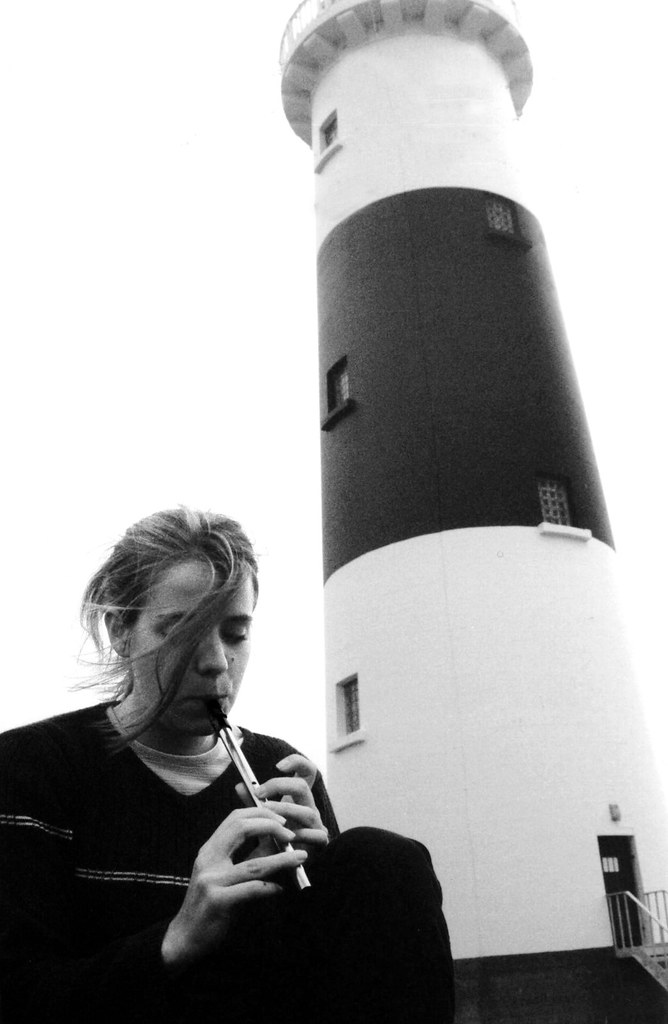
Penny Whistle: photo by dsasso, 12 January 2006 (National Archives UK)
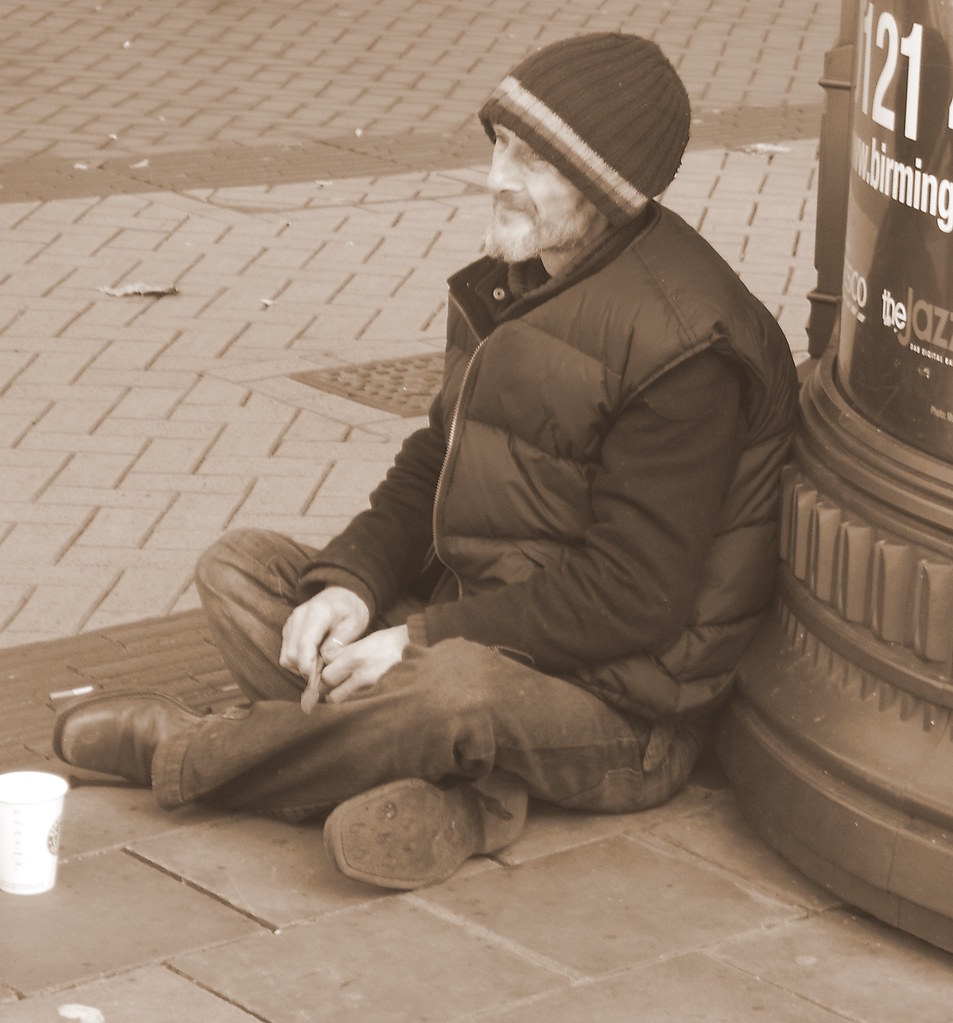
Pennywhistler: photo by Liam Seasby, 19 July 2007 (National Archives UK)

Pennywhistler: photo by Kate (dicegirlsnapz), 15 September 2010 (National Archives UK)

Morgan playing the penny whistle (Manchester homeless): photo by Ian (krishudds), 19 April 2013 (National Archives UK)
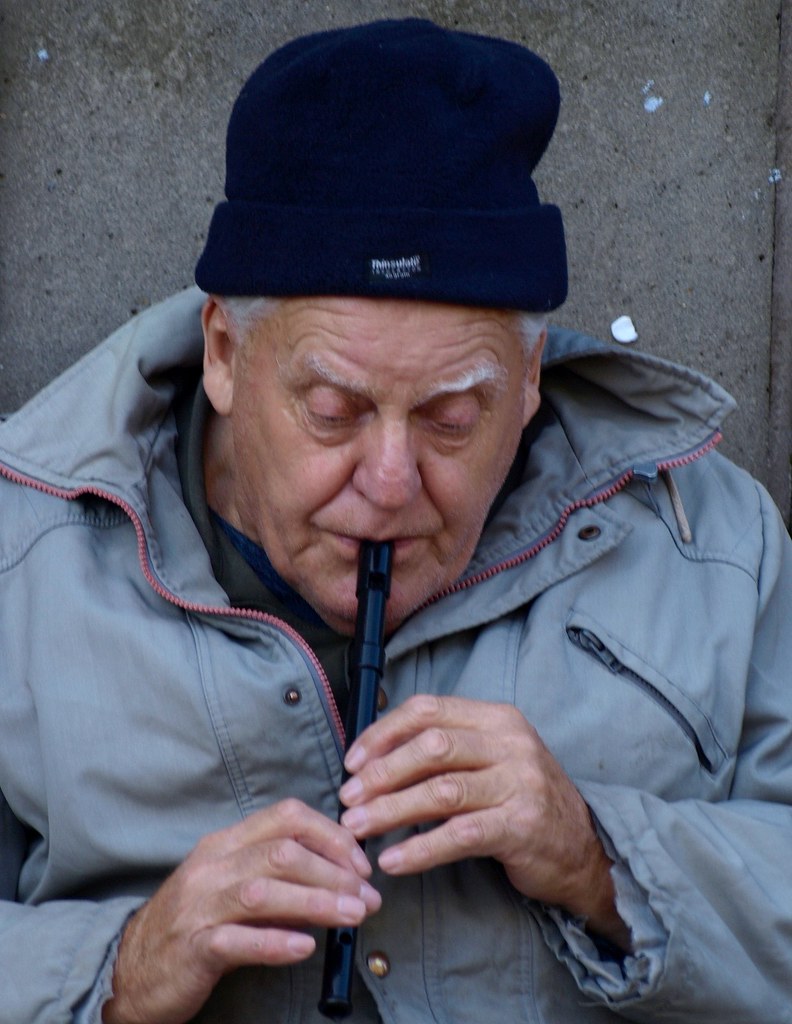
The Whistler, Belfast. I swear this is the same wee man I seen in Ballycastle at the Lammas Fair two years ago: photo by *~Mac Bern~* aka Argyll Images, 11 October 2008 (National Archives UK
)
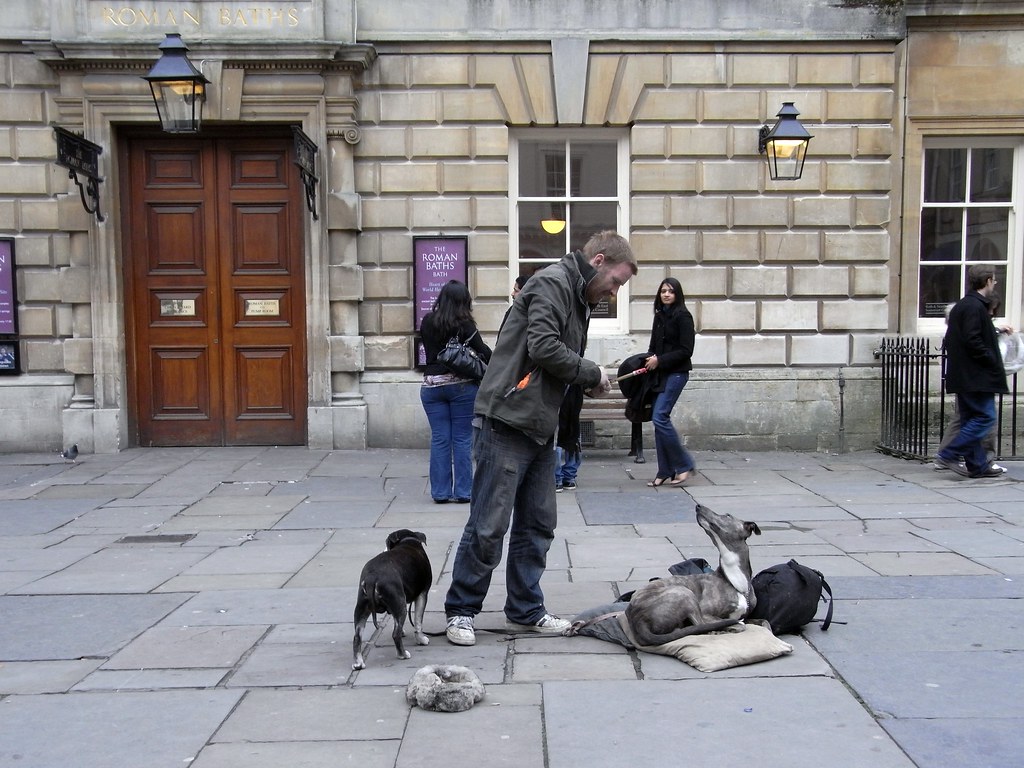
Street pennywhistler with his dogs, Bath: photo by John Gulliver, 10 April 2009 (National Archives UK)

Waltzing Matilda. We'd hear his pennywhistle if we had photos with sound (Ludlow, UK): photo by Chris Mullineux, 23 August 2012 (National Archives UK)



8 comments:
"Charles Murray (1864-1941), born and brought up in Alford on Donside, was the most well known Scots poet of the first half of the last century. He wrote in a lively and bold form of Scots drawn from the language of his own Donside. His first collection, Hamewith, was so popular that he came to be known as “Hamewith” himself. It wasn’t only in the North East but wherever the Lowland tongue was used, in and outwith Scotland, everyone young and old learned “The Whistle”, “It Wasna his Wyte” and “There’s Aye a Something”.
"So effective is his grasp of the cadences of the local dialect it may be assumed that Murray’s poems are meant for reading aloud. They present to us a picture of life in the country districts Murray knew when he was a boy -– the hills and fields, the people and their activities and entertainments and, above all, their language." -- Scots Language Centre
The Whistle is a poem that needs to be heard. You can listen to a a reading here
In Scotland: An Intimate Portrait, Geddes McGregor writes:
"Charles Murray (1864-1941 wrote in his own Buchan dialect, with all the Scandinavian elements of that part of Aberdeenshire. Of all the Scotsmen who have written poetry in their native dialect, he is probably the most genuine poet other than Robert Burns, who would have had difficulty understanding him, such are the disparities of regional speech. Murray's dialect is much more difficult for most Americans than that of Burns, and for that reason he is too little known, which is a great pity."
Charles Murray's The Whistle put to tuneful purpose on the pennywhistle by Alex Green ("The Turra Tootler"), Scotland's best known tin whistler
Photo of Charles Murray, in the 1880s, around the time his verse first began to appear in periodicals like the Edinburgh-based Scots Observer
Great stuff. Thanks, Tom. (Whistles can be played indoors as well, but bagpipes should always remain outdoors.)
Thanks, Terry. This is definitely your area of expertise.
Fifty years ago, living on the Newmarket Road in Cambridge, I had a flatmate who was a passionate player of the bagpipes. I believe he may have attempted to practise in the house... exactly once, and managed maybe three notes before (figuratively speaking) bringing the house down. For weeks after, he was treated with meaningful silence and scowls. After that I would see him, in his kilt and all, playing his pipes to his heart's content, on a sizeable greensward called Midsummer Common, well out of earshot of anyone who did not wish to be hearing him.
A pity, because the music he produced with his pipes was, I thought, totally swell. Especially from a fair distance.
Great post. The pipes really have to be played well--I have a friend who plays the tin whistle--sends the dogs right out of the room, and I wish I could follow them!
He puffed his freckled checks until his nose sank oot o' sicht.
That's an image that stays in the head, like something out of a D. C. Thomson comic or a late Guston painting.
I really wasn't expecting the last line: bloody heartbreaking. That's maisters for you, I suppose.
The chap in the third photo is a local. He improvises his own off kilter melodies.
Listening to the poem while watching the second picture. Whistle and wind are blowing, particles of salt in the air. It's a delight.
Many thanks all. Duncan, I'd guessed you might have seen (and heard) that chap.
High-pitched noises if not properly musical may indeed affect many nervous systems adversely. There are those sounds which allegedly only dogs can hear, and in turn, those sounds which humans may hear, but by which they may well be driven up the wall. Perhaps as with so many things it's a matter of atmosphere and context, spatial arrangements and company (or lack of same).
I've presumed that this piece, like many of the poems in Murray's Hamewith (looking homeward, roughly) may date from his early years under alien stars, having gone out to the Transvaal to seek (and eventually, it seems, find) fortune as a prospector.
Nostalgia of retrospect, maybe... though is not so much of what is, or anyway was once thought to be, poetry, with its inbuilt and essential memorial function (keeping the memories green, back in those "simpler" times when there could still exist such things as at least relatively untroubled memories), indeed precisely that?
Post a Comment